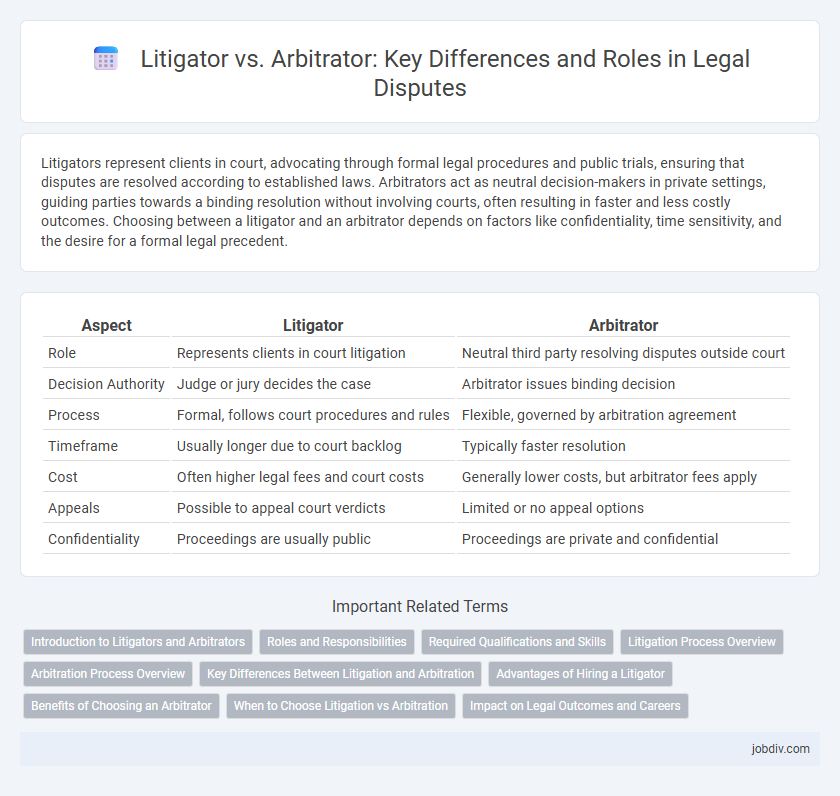Litigators represent clients in court, advocating through formal legal procedures and public trials, ensuring that disputes are resolved according to established laws. Arbitrators act as neutral decision-makers in private settings, guiding parties towards a binding resolution without involving courts, often resulting in faster and less costly outcomes. Choosing between a litigator and an arbitrator depends on factors like confidentiality, time sensitivity, and the desire for a formal legal precedent.
Table of Comparison
| Aspect | Litigator | Arbitrator |
|---|---|---|
| Role | Represents clients in court litigation | Neutral third party resolving disputes outside court |
| Decision Authority | Judge or jury decides the case | Arbitrator issues binding decision |
| Process | Formal, follows court procedures and rules | Flexible, governed by arbitration agreement |
| Timeframe | Usually longer due to court backlog | Typically faster resolution |
| Cost | Often higher legal fees and court costs | Generally lower costs, but arbitrator fees apply |
| Appeals | Possible to appeal court verdicts | Limited or no appeal options |
| Confidentiality | Proceedings are usually public | Proceedings are private and confidential |
Introduction to Litigators and Arbitrators
Litigators are legal professionals who represent clients in court proceedings, advocating for their interests through trial and litigation processes. Arbitrators act as neutral third parties appointed to resolve disputes outside the courtroom, delivering binding decisions based on the evidence and arguments presented. The roles of litigators and arbitrators differ significantly in how conflicts are managed, with litigators focusing on adversarial court battles and arbitrators emphasizing private dispute resolution.
Roles and Responsibilities
Litigators represent parties in court by preparing cases, presenting evidence, and arguing legal points to achieve favorable judgments. Arbitrators serve as neutral decision-makers who evaluate evidence and legal arguments in private dispute resolution processes, issuing binding or non-binding awards. While litigators advocate for clients within the judicial system, arbitrators facilitate efficient conflict resolution outside traditional courts.
Required Qualifications and Skills
Litigators must possess a law degree, pass the bar exam, and demonstrate strong analytical skills, persuasive communication, and courtroom experience to effectively represent clients in trials. Arbitrators require expertise in their specific industry, certification from recognized arbitration institutions, and skills in negotiation, impartial decision-making, and dispute resolution. Both roles demand exceptional legal knowledge and the ability to interpret contracts and statutes accurately.
Litigation Process Overview
The litigation process involves formal court procedures, including filing complaints, discovery, motions, trial, and appeals, managed by a litigator who advocates for their client's legal rights. Arbitrators oversee arbitration, an alternative dispute resolution method, where parties agree to resolve conflicts outside court, focusing on efficiency and confidentiality. Unlike litigators, arbitrators do not engage in extensive discovery or trial but render binding decisions based on evidence presented during hearings.
Arbitration Process Overview
The arbitration process involves disputing parties presenting evidence and arguments before a neutral arbitrator or panel who renders a binding decision outside the court system. Unlike litigators who advocate in public court trials, arbitrators act as private judges facilitating a faster, confidential resolution tailored to the contract terms. This streamlined procedure reduces legal costs and avoids lengthy litigation, making arbitration a preferred alternative dispute resolution method in commercial and civil law contexts.
Key Differences Between Litigation and Arbitration
Litigation involves resolving disputes through the public court system with a judge or jury making a binding decision, often extending over months or years with formal procedures and appeal rights. Arbitration, a private dispute resolution method, uses a neutral arbitrator whose decision is typically final and confidential, offering faster resolution and more flexible procedures. Key differences include the level of formality, the role of public courts, the appealability of decisions, and the overall time and cost commitment.
Advantages of Hiring a Litigator
Hiring a litigator offers the advantage of expertise in courtroom procedures and in-depth knowledge of legal precedents essential for complex dispute resolution. Litigators are skilled in advocacy, presenting evidence, and cross-examining witnesses, which can significantly impact the outcome of a trial. Their experience in negotiating settlements under threat of trial often leads to favorable terms without prolonged arbitration processes.
Benefits of Choosing an Arbitrator
Choosing an arbitrator offers benefits such as faster resolution of disputes compared to traditional court litigation, reducing time and costs for parties involved. Arbitrators provide flexibility in procedure and scheduling, allowing customized approaches tailored to the specific needs of the case. Confidentiality in arbitration protects sensitive information, preserving business reputations and minimizing public exposure.
When to Choose Litigation vs Arbitration
Litigation is preferable when a legally binding precedent is necessary, public court records are desired, or when parties seek the enforcement powers of a court. Arbitration suits disputes requiring confidentiality, faster resolution, and the expertise of a neutral arbitrator with specialized knowledge. Choosing between litigation and arbitration depends on factors such as desired privacy, case complexity, cost considerations, and enforceability of decisions.
Impact on Legal Outcomes and Careers
Litigators influence legal outcomes through courtroom advocacy, shaping case law and setting legal precedents that can impact future rulings. Arbitrators provide binding decisions in alternative dispute resolution, offering faster, confidential resolutions but with limited precedential effect. Career trajectories for litigators often involve courtroom experience and public recognition, whereas arbitrators typically leverage specialized expertise and reputation in private dispute resolution.
Litigator vs Arbitrator Infographic

 jobdiv.com
jobdiv.com